|
FAQs about Health/Diseases, Pests of Soft
Corals of the Family Alcyoniidae 7
FAQs on Alcyoniid Disease:
Alcyoniid Health 1,
Alcyoniid Disease
2,
Alcyoniid Disease 3,
Alcyoniid Disease
4, Alcyoniid
Disease 5, Alcyoniid
Disease 6, Alcyoniid
Disease 8, Alcyoniid
Disease 9, Alcyoniid Health 10,
Alcyoniid Disease
11, Alcyoniid
Health 12, Alcyoniid Disease 13,
Alcyoniid Disease
14, Alcyoniid
Disease 15, Alcyoniid Disease ,
FAQs on
Alcyoniid Disease by Category:
Diagnosis,
Environment,
Nutritional, Pathogenic (Infectious,
parasitic), Predator/Pests,
Social, Trauma,
Treatments
Related Articles: Soft Corals of the Family
Alcyoniidae
Related FAQs: Soft Corals of the Family Alcyoniidae,
Alcyoniids 2, Alcyoniids 3, Alcyoniids 4, Alcyoniid ID, Alcyoniid Selection, Alcyoniid Compatibility, Alcyoniid Systems, Alcyoniid Behavior, Alcyoniid Feeding, Alcyoniid Propagation, Soft Coral Propagation, Soft Coral Health, Dyed Corals, Soft Coral Propagation, Nephtheids, Dendronephthya, Paralcyoniids, Nidaliids, Xeniids, Dyed
Corals,
|
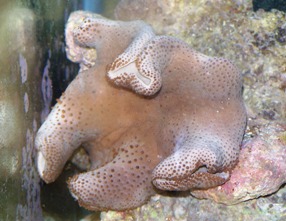
|
Toadstool necrosis and healthful timing
3/21/07 Hi GrahamT, <Hello, Daniel.> I am sorry for the
misspellings and other errors in the previous e-mail. <I
understand the constraints on your time, and thank you for your
consideration. I will do my best to reciprocate.> I have a
question about my toadstool that I have in my 135 gallon Reef tank.
I bought it about 3 weeks ago at a LFS. It fully extends during the
day with all polyps out. <Excellent.> But at the base of the
coral it seems to be deteriorating or going necrotic. <Ahh...I
see.> I have read through the website and found some helpful
ideas. My question is when I cut the head of the coral off and toss
the stem out have I already infected the rest of the tank even
though I have no other leathers? <Hmm, *I* can't answer that
directly. I am not sure about the pathogen, if any. I will tell you
that this is usually a chain-reaction on the cellular level, where
contact is a requisite 90% of the time; meaning that if you cut off
the affected part well into the "good" tissue, you can
curb its spread.> Where does this infection usually come from
miss handling in transit? <It can start from a physical trauma,
or injury. Sometimes, it seems as though the specimen has had it
with its location and oozes away.> Will coral dipping help to
control the infection? <Doubtful. It *may* have done something
useful previous to this condition, but probably not. I would say
that the possible benefits don't outweigh the risk of extra
stress at this point.> The tank parameters are:
Salinity: 1.025
Nitrate: 0 ppm
Nitrite: 0 ppm
Ammonia: 0ppm
Calcium: 450
ppm Temperature: 81
degrees F <All good...> The inhabitants are:
160 pounds of live
Caribbean rock 120
pounds of live aragonite sand
Fairy Wrasse
2" Carpenter
Wrasse 2" Blue
bar Pseudochromis 2"
Blue Devil Damsel
1" South Seas
Devil 1" 2x
Blood Shrimp 2"
Assortment of
snails and hermits. Equipment is:
2x Mags 9.5
2x Aqua clear
701's power heads
Dual 400W Double
ended 14k MH
SeaClone 150
protein skimmer <Do you like this skimmer?> Water changes are
done once a week at 10% Here is a pic of it the first day I brought
it home. http://i101.photobucket.com/albums/m46/blackhemi35003/DSCF0443.jpg
<Looks normal there. I think that all in all, you've got the
right idea. I want to thank you again for taking the time to repost
your query, and for taking the initiative to help your charge(s) by
researching. (It makes me feel... well, vindicated) Daniel
Carrel
<GrahamT> |
|
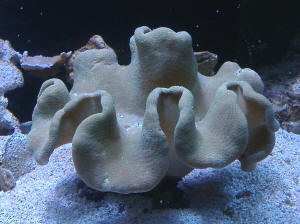
|
Who's eating my leather coral?
3/11/07 Tank Specs 55 gallon reef VHO dual
satellite fixture Nitrates=5ppm Calcium=500
<Mmm, high...> Alkalinity all <?> other
parameters optimal Protein Skimmer Produces Well
Carbon being run currently to offset any output by sick
coral All inhabitants doing well for about a year
Inhabitants include various soft corals
mushrooms/xenia/clove/Galaxea/BTA <Incompatible>
Lyretail Anthias/solar fairy wrasse/maroon clown
Various Inverts serpent stars/snails (pyramid/turbo)
/cleaner/fire shrimps/urchins/small hermits/ Okay, everyone
is happy and healthy until today. A leather coral has two
small but rather deep wounds in it that look like bite marks, but they
are rather round to be bite marks. They are slight
indentations into the flesh around the base. Yesterday there
was only one on the base and one near the top. If I blast
with baster some white flesh (?) comes off. Today there were
two additional holes one on top of the other on the other side of the
base. According to your posts I think it is a predator
because there are indentations, as opposed to growths. Is
this a correct assumption? <Maybe> Is there a
predator that would focus on a leather coral, as it is the most recent
addition (about one month in main tank)? <Yes... some snails,
worms...> Again none of the other corals in the tank have ever been
affected by anything like this. Although there is one
additional issue that may be a contributing factor. Recently
there was some hastily added water in a water change that was not of
the proper temperature. Could this somehow have created this issue for
this coral? <Mmm, not likely> I think not but no other changing
factors have been involved. The coral is still extending polyps well
but the addition of more holes is very concerning. It is a
tremendous specimen. Any advice to try and remedy or help it
heal? <Mmm, well... it's really hard to judge such issues w/o
graphics... The best thing you could do is move this animal to another
system... There is strong reasons to suspect general allelopathy is at
play here... small volume, noxious cnidarians resident... the Anemone
should be moved ASAP...> I am hesitant to cut or frag because it is
so close to the base and deep. I don't want to affect
the overall health of the specimen by undermining its
base. Any suggestions would be of great help.
Awaiting Instruction <I strongly encourage you to read
re the Systems, and Compatibility of each of the Cnidarians you list.
Here: http://www.wetwebmedia.com/marine/inverts/index.htm Bob
Fenner>
Toadstool question, No Polyps, No Problem.
3/3/07 Hey guys! <Hi Carrie, Mich here.> I was at my LFS,
which has a small and sad saltwater section, and saw a small toadstool
coral on some live rock looking very upset. The Naso Tang
they had in the tank may have nipped it. I had an
"I'm going to rescue you" moment and bought the coral for
a reduced price, as it never opened for them and they have assumed that
it HAS no polyps. I've had it placed in the bottom of a
high light tank qt for 4 days now. So far it truly only has
a few tiny pathetic little polyps. <It will get
more.> The bite marks are healing nicely and the coral isn't
shriveled, it just has opened no polyps. I'm just
curious, are there toadstool corals that are simply not well endowed
like others? <Well initially that may be the case, but
you can frag this coral any which way and the frags will grow into big
healthy specimens.> If the coral feeds from these polyps and it
doesn't actually HAVE any, then the coral would starve, right?
<No, this is a photosynthetic coral. Remember
Zooxanthellae?> Maybe it's just a late bloomer? <If provided
the proper conditions it will grow.> Thanks for your time,
<Welcome! Mich> Carrie
Colt Coral RTD, Time to Frag!
3/4/07 Hey guys, <Hi Carrie! Mich here.> I had an
incident a few days ago with my HOB fuge/skimmer, it essentially broke
off the tank and pumped 10 gallons of water out onto the
floor. <Oh, no fun here!> None of the corals were
exposed, it was just a mess to clean up and I'm waiting for parts
so I can put it back on. Since this time (and it may be
unrelated) my colt coral (Cladiella spp.) has started to turn
brown. I've been siphoning out the slime and I fragged a
piece off that seemed to be ripping away, but the coral continues to
fall apart. <I think I would frag it and remove all
discolored areas, sooner better than later.> I've done daily
water changes and checking of tank parameters. This has
always been my most beautiful tank, with some very healthy
corals. But since this incident with the colt coral, my
toadstool doesn't want to completely open and even my plume sea fan
won't open. <Could be some allelopathy, mucus, and tissue
necrosis issues occurring.> Although, there is a tiny toadstool frag
that is open and happy. Tank is as follows: ammonia 0 nitrite 0 nitrate
<10 (total nitrate) SG 1.245 <?> temp 78 calcium 400 ph 8.2 5
watts per gallon metal halide tank mates: maroon clown Midas blenny
feather dusters finger leather frag 2 toadstools, one large, one frag
purple plume sea fan 2 brain corals (both open and looking good)
Thoughts? <Potential for some chemical warfare to be
going on, I think you should add or change your carbon.> What could
cause the coral to just die off with no apparent reason? <There is
most likely a reason, what it is however can be difficult to
determine. I'm not seeing anything obvious, maybe
removing the refugium had some unforeseen
repercussions. Were your nitrates at zero before the
incident?> Thanks for your time, <You're
welcome! -Mich> Carrie Should I completely remove the
colt coral? (which would mean cutting it away from a very
large rock that it has grown over) <See above re discolored
areas.>
Re: Toadstool question, No Polyps, No Problem. /Colt
Coral RTD/Toadstool, Algae and Phosphates Oh My! 3/16/2007 Hi
again, <Hi Carrie, Mich with you again.> This is still an issue
with the tank in the earlier message, but this time about the toadstool
corals. I removed the sick colt coral and put it in QT and
did iodine dips on it. It broke up into several pieces and those are
actually doing great now. So at least there is progress
there. <Very good to hear!> I removed the brain
corals from the tank in question in case there was any bio warfare
going on and I got the fuge installed again.
<Excellent. It is connected to the display correct?>
Some pods and worms died in the fuge before I could get the parts for
it, and I did a 100<%?> water on the fuge before installing
it. Now my plume sea fan is open again and happy.... and now
it's the toadstool coral, and the toadstool frag that refuse to
open! <OK.> They have been closed up for about 4 days
now. I have a small brown algae bloom, possibly from the
fuge needing to grow new bacteria. <Possibly a
contributing factor.> I feed sparingly as there are only 2 fish and
a cleaner shrimp that need Mysis. <Very important, may want to
temporarily cut back slightly.> Tank parameters: amm.0 nitrite0
nitrate<5 (total--down from the 10 after the fuge fell
off)<Odd> sg 1.0245 temp 78 calcium 450 <Under 400 is
better> pH 7.8 to 8 fluctuating (could this be my problem?)
<Slightly higher would be better> phosphates 0.1 (added a
phosphate remover in case this was causing the brown algae bloom,
although I doubt it) <Is likely, at least in part the source of your
problem. This should be undetectable. Hopefully
the refugium will help this issue now that it has been reinstalled, a
couple of big water changes would be helpful too.> The toadstool
corals have the brown algae growing on them somewhat, which I have been
brushing off with my coral brush once a day hoping for some
polyps. <It is good that you are removing the
algae. You may need to increase your circulation around the
toadstool at least temporarily.> The only other issue I've had
is some red flatworms that I have been sucking out with my
"flatworm vacuum", an airline tube... then I usually do a 15%
water change after that deed. <Good.> I did that
yesterday as well. No change. The big toadstool
is a beautiful specimen and I don't want to lose him. <Are
pretty hardy. Watch your phosphates, I think this is the
problem.> Thanks for all you do~ <A pleasure. Mich>
Carrie
Re: Toadstool question, No Polyps, No Problem. /Colt
Coral RTD/Toadstool, Algae and Phosphates Oh My!
3/21/07 Hi again, <Hi Carrie, Mich here.> An
update on my toadstool.... it has been hunched over for days now...
every day he seems to be worse. <Uh oh!> His flesh is
no longer pink but an ill looking gray. He has started to
peel flesh, not the waxy coating that you would normally see, but
layers of skin then exposing the bumpy flesh underneath like tiny
pores. What is happening to him? <It sounds
like you're pretty sure that this is not a normal shedding of waxy
tissue. This can be quite dramatic. Does the
tissue seem like it is disintegrating?> Tank parameters are the same
as before. I have been doing water changes either daily or
every other day. Should I try an iodine dip on
him? <You could, it shouldn't hurt him.> The
reason I have not done this already is that he is attached to a big
rock that is pretty much holding all the other rocks up, so the tank
will have to be essentially to get him out without peeling him off the
rock. Do you have any suggestions? <You could peel or
slice him off the rock. If there is no tissue necrosis, I
would wait this out a bit. If the tissue is deteriorating,
and "cheesy" then I think you should remove him, slice him
off if need be, and try a dip in Lugol's solution. The
recommended dose is 10 drops per quart or liter. More here:
http://www.wetwebmedia.com/alcyondisfaq4.htm
http://www.wetwebmedia.com/alcyondisfaq5.htm
Thanks so much, <Welcome, I do hope you have
improvement. -Mich> Carrie
| Colt coral with blisters question
3/4/07 WetWeb Crew, <Hello James, Brandon here.> I've
recently purchased a Colt coral from Saltwaterfish.com, and it
seems to be doing well in my tank, however, it has some blisters
which appeared on the stalk. The blisters are on the of
the stalk which gets the most light.<Could be allelopathy. See
here, http://www.wetwebmedia.com/alcyoncompfaqs.htm. You
did not mention the Klyxum's proximity to the
Sarcophyton. I would think that chemical warfare could
be at work. To combat this, use 2-3 ounces of granulated
carbon changed weekly, poly filters, and good
skimming.> The coral is about 12" below the
surface, and placed in good light with strong flow. Are
these blisters of concern? Picture attached (photo left
shows blisters). Set-up: 70gal, 225W VHO (2x10k, 1x12k,
24"), 98W SunPaq quad, Turbomedic skimmer, sump w/d trickle w/
biomedia, 70 lbs LR, 2x Clarkii, 2x Ocellaris, Royal Gramma, 3x
Green Chromis, Colt, umbrella coral, 2x green mushroom polyp, many
hermits/snails, 3x emerald crabs, 1x Sally lightfoot crab, 1x coral
banded shrimp. Water: sg 1.024, pH 8.3, Alk 4.5 meq/l,
Nitrate/nitrite - not measurable, tot ammonia 40 ppb, free ammonia
20 ppb, <Your ammonia level is too high. Anything
over zero is unacceptable.>calcium 460 mg/l, 5 - 8 gal change
every other week, calcium, Kalk, iodine, strontium/mb dosing with
evaporation replacement water, which is ~1gal / day. <I am not a
fan of dosing anything other that I, and Ca. I hope this
helps. Brandon> -James |
|
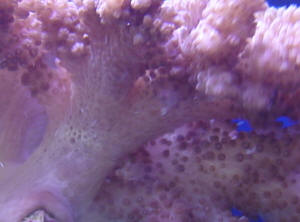
|
Re: Mushroom Anemone and Soft Coral Help (update) Soft
Coral Problems -- A follow-up - 2/28/07 Hello Justin, it's Ben
here from the UK. I hope you remember me ( I have attached the last
email that I sent just in case you don't). <Hey Ben! Great to
hear from you again!> I trust you had a great xmas and new year.
<Indeed I did; the aquatic Santa was kind to myself and my tank this
year *grin* I hope the same for you and yours, my friend.> I just
wanted to update you on the progress of my tank. <Excellent, cant
wait!> Previously I mentioned that I had ordered two 18watt T5 bulbs
but unfortunately my LFS was having problems with the suppliers so that
never materialized; however I managed to snap up a bargain on EBay in
the form of a 150watt metal halide with a 14000k bulb. <Do keep an
eye on your evaporation levels and temperature here... If I recall
correctly, you've got a fairly small body of water, right? These
lights put out a lot of heat, more than you may be prepared for... This
isn't to say you've made a bad choice, but instead just that
you'll have to monitor things with diligence.> Since I have
upgraded my lighting I have noticed big changes; one example would be
that my colony of brown button polyps has now got a nice green/blue
tinge to their centre and have doubled in size. :) <Excellent to
hear!> However it has not all been good; before I installed my new
light I did some research on the positioning of it (I figured it would
be quite a shock going from a dull light to an extreme light) <You
are correct> so I placed the light 18inches from the waters surface
and gradually brought it down to 10inches over the course of 2 months.
<Another course of action would be to go to a local hardware store
and buy a decent amount of mesh screen for window covers, and use this
in layers over the tank to simulate 'cloudiness' and reduce the
light penetration, but as the old adage goes, 'hindsight is
20/20'.> Unfortunately this was all too much for my larger
Toadstool and after a few days it bleached, luckily it seems to be
healing, does this happen? <Oh, yes.. Soft corals are not nearly as
light demanding as their stony brethren, and have to be acclimated to
their conditions, and given time to recover.. I think all will be fine
here, in time.> And is there anyway that I can help? (I feel I
should mention that I have moved the coral to a shaded area of the
tank). <Then you've already helped as much as you can for now,
my friend. Just keep moving the coral more into the light slowly as the
recovery warrants it. You'll eventually find its sweet spot, and
all will be well once again.> I have taken my horrible under gravel
filter and powerhead out along with the crushed coral substrate and
replaced it with a maxi jet 400lph powerhead with the gyro attached,
CaribSea live sand (sugar sand I think) and an AquaMedic Biostar Flotor
wet dry filter and protein skimmer (a bit of an overkill for my tank I
didn't realize how big the pump was - 2000lph!!). <Excellent. Do
be sure to clean out your wet/dry media regularly (every water change)
in tank water to keep it from becoming a nitrate farm.> I have also
purchased two mangrove plants and some macroalgae to reduce my nitrates
and organics. <While they won't hurt anything, don't expect
a whole lot of effects from the mangroves... they're really more
decorative in this type setting. Good move on the algae though, my
friend.> Hopefully this will result in a great improvement with the
health of my inhabitants. If you have any suggestions please let me
know and I will act upon them. <Just as stated above; I feel
you've got the right ideas already and are aware of how to
'educate yourself.' Your responses and courses of action
certainly show this.> I do have one question to ask before I go;
I'm thinking of moving my inhabitants into a 3ft ClearSeal tank,
can this be done safely? <Absolutely, but you will be likely dealing
with a minor cycle again after the move. See our sections about tank
moving for more info here.> Thanks very much for all of your help,
you have been an excellent source of information for
me. <Thank you for this, Ben. We're glad to
help. -JustinN> Ben Sandford
UK
| Leather hlth... predation?
Allelopathy? 2/22/07 Hello Crew <Wayne> I
could really use your help here. Can't seem to find
anything on the site. I know I've been writing
you a lot lately, but questions keep coming. My leather
seems to be falling apart. See pics attached. I woke up
the other day, and noticed that one of its stalks/arms was missing.
I thought maybe it was the Condy anemone, maybe my Tuskfish ate
it...and dismissed the incident. <Could be the effect of
either...> Well, I found the stalk that had fallen off, and it
was dead and starting to rot (brown, slimy and stinky). You can see
where the stalk fell off on the pic...it's the big white spot.
It seems like the spot is spreading, and the next stalk appears to
be weakening. I figured if a stalk fell off, it would in essence
frag itself, so I was startled when I found it dead. Any thoughts?
The leather is 1.5 years old and has grown tremendously over the
years. I just added more LR 1 week before this happened. Maybe a
hitchhiker of some sort. <Mmm... I'd move this specimen if
it were mine... away from whatever the mal-influence is here...>
I have a Condy anemone, some zoos, <These could also be a source
of trouble here> and a colt coral. Also have Volitans lion,
Harlequin Tusk, and a damsel. Parasite maybe? <Mmm, the last is
unlikely... If you have to leave this animal here, I would check
your water quality and bolster your Iodide supplementation... if it
continues to disimprove, I would definitely move it... and if it
"falls apart" even more, frag it... You have read on WWM
re Alcyoniid health I take it. Bob Fenner> |
|
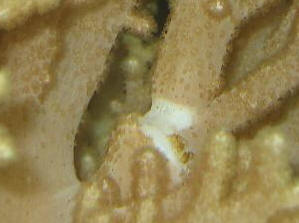
|
Toadstool detaching from live rock... Frag it!
2/12/07 <Greetings, Mich here today.> My toadstool is
becoming unattached to its rock, as if it is ripped or torn. Is there
anything I can do to save it? <Yep! Frag that bad boy!
http://www.wetwebmedia.com/softcorpropfaqs.htm >
I not sure but could be poss. that the water current was to strong.
<Possibly.> Since then I have readjusted the toadstool and power
head. <OK.> The toadstool polyps still comes out as if it is
still trying to live. <Yep it should, it is a hardy coral.> Is it
best to leave it alone hoping it will reattach or to completely remove
it from the rock or will it die? <The first two choices are
options. It shouldn't die. But if the area
looks necrotic I would cut it off and start with a fresh, clean cut. If
the stem is long, chop of a couple pieces and raise some
frags! Use a rubberband and attach them to some small pieces
of live rock. You can do it!> thanks in advance
<You're welcome! -Mich>
| Toadstool leather -
02/09/2007 Hi WWW crew, I sent these pictures a few days ago
and the toadstool leather has worsened but also looks better.
<Huh? Am I a bit richer, but poorer today? Maybe> He is
slumped over all the way almost laying flat but he has turned a
nice purplish color and his "pores" are opened.
<Yikes... not supposed to be purple...> The base still looks
wrinkled and I panicked. <Uhh> I grabbed a tool and pushed
him upright as much as possible. <Not a good idea> He is now
holding his weight up but when I pushed him up straight I could see
dust floating away in the water and it was coming from the back of
the base. That seemed bad and that maybe he is necrotic
at the base where I can't see it. <Perhaps> I'm not
sure what to do. It is still shedding but it is almost
done. If you have any thoughts I would appreciate it.
Thanks Paul <Please read here: http://wetwebmedia.com/alcyondisfaqs.htm and the linked
files above... Much you have not given/stated... and much that
could be wrong/at fault here... Read, and soon. Bob
Fenner> |
|
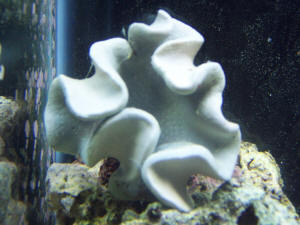 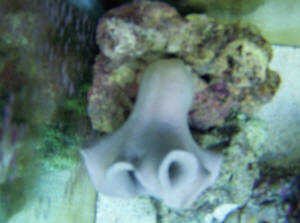
|
Re: toadstool leather - 02/11/2007 Hi Bob,
Thank You for your response. I'm sorry
I didn't give you enough info. After reading your comments and
realizing the purplish color isn't good for the leather I took
my water to the store and had them test my calcium, dKH, and pH.
<Need to test for yourself...> Calcium is 380, dKH is
9 (I am slowly raising those to 400 and 10-12) but my PH
was only 7.9. I couldn't believe it because my xenia
has been pulsing like crazy since I bought it over a month
ago. They retested it with a different kit and the
results were the same. <Read... on WWM re...> I threw my test
kit away when I got home and am now using Salifert. I am
now slowly raising the PH with a marine buffer.
<Ditto> I had to rethink and reread how I was making up my
water. I wasn't buffering it properly because I
thought my PH readings were correct. <Ahh> I
attached a picture of how it looks now. I hope you get
it. I think this is the first step to
recovery. I am leaving the Toadstool
Leather alone in hopes that it makes the recovery. <Good>
Thanks for all of your hard work and dedication.
Thanks, -Paul 55g 29g sump/refugium with Chaeto 60lbs of LR
3.5" DSB, slowly raising 1300gph of flow 2 clowns 1 damsel 1
banded goby - eats frozen Mysis as well 1 small Xenia 1 small
colony of yellow polyps 1 hurting Toadstool Leather
<Bob Fenner> |
|

|
|
|

